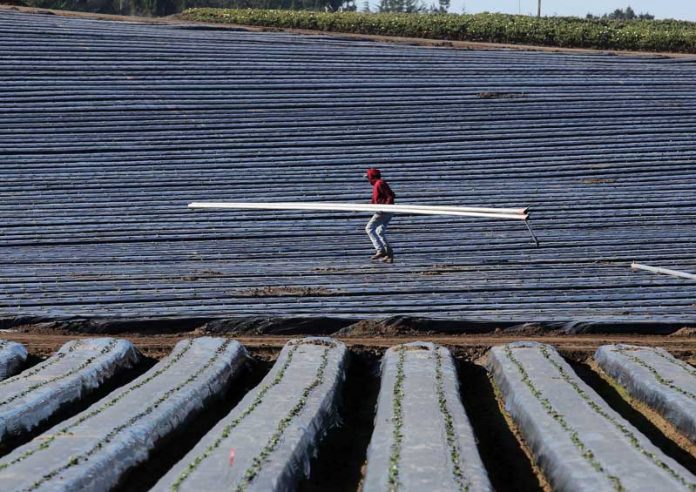
CENTRAL COAST—Many Monterey County farmworkers are going to work despite testing positive for the novel coronavirus, and some of those laborers are doing so because they are concerned about losing their job, their pay or because their employer told them to.
That’s according to the preliminary findings of a study led by researchers at the UC Berkeley School of Public Health and Dr. Maximiliano Cuevas, the CEO of the Clinica de Salud del Valle de Salinas (CSVS).
The study, named Prevalence and Predictors of SARS-Cov-2 infection among Farmworkers in Monterey County, found that more than half (58%) were going to work when they had tested positive and showed symptoms because they felt well enough to work. A quarter of those respondents, however, did not quarantine themselves because they feared financial loss.
“These findings validate concerns from researchers, public health professionals and community advocates that farmworkers would suffer from the Covid-19 pandemic in California,” Joseph Lewnard, assistant professor of epidemiology at UC Berkeley and a member of the study team, told Berkeley News. “We have failed to protect this population, while they have continued to engage in essential work through the pandemic.”
The study from mid-July to November asked hundreds of farmworkers that visited CSVS’s network of clinics for a Covid-19 test—and a few dozen others found through community outreach—several questions about their household demographics, including main language spoken at home, employment information and their Covid-19 risk factors and safety practices at home, in the community and in the workplace, among other things.
Roughly 20% of those surveyed by the end of October had tested positive for the antibodies to Covid-19, meaning they had previously been infected. In addition, 24% percent of respondents said the virus had an “extremely negative” impact on their life.
The goal of the study, Cuevas said, was to find out why and how so many farmworkers in the Salinas and Pajaro valleys were testing positive for Covid-19 and what could be done to slow the spread. The data collected, he said, paints a picture of where the spread is happening, and the next steps needed to be taken.
Where is the disconnect?
The study found some employers (45%) are not properly screening farmworkers for Covid-19 symptoms or high temperatures before they began their shift. However, it also found that the vast majority of employers were doing well in keeping farmworkers safe in the workplace.
Nearly all (99%) of farmworkers reported that their employer provided handwashing stations and liquid soap and paper towels. In addition, most employers provided hand sanitizer (91%), frequently cleaned surfaces (86%) and provided face coverings (85%). They also reported that the majority of employers have educated them about how to protect themselves at work (97%), been told to social distance (96%) and been informed of the importance of staying at home when sick (93%).
The trouble, Cuevas says, is that some farmworkers were not aware that they can qualify for replacement income and emergency housing in order to quarantine when they have tested positive. About 72% of respondents said their employer told them about where they can get a Covid-19 test, and 69% said their employers had explained how to access sick leave.
That education and information gap, paired with cramped housing situations that have plagued low-income farmworkers living on the pricey Central Coast for years, has exacerbated the pandemic in those communities, Cuevas said.
“Overcrowded living conditions is a huge factor here,” he said.
What is being done?
Monterey County, which has a population of roughly 435,000, has conducted more than 150,000 Covid-19 tests. But Cuevas says that is not enough to understand the true scope of the outbreak and what areas of the county need more attention and resources.
“In reality, we should be closer to half a million tests for a county our size,” he said.
CSVS has tried to close that gap by offering testing at its 11 clinics throughout Monterey County, and the organization is also hosting pop-up testing sites throughout the week in King City (Monday), Soledad (Tuesday), Salinas (Thursday & Friday) and Las Lomas (Saturday). All of them are located at community markets, bringing testing directly to those communities.
In Monterey County, there are four community testing sites run by the state and OptumServe where anyone can get a test for free, even those without insurance. Most Doctors On Duty locations, CVS pharmacies, county hospitals and several clinics are also offering testing, but with various restrictions—some charge around $140 for a test while others require insurance and for a person to be showing symptoms.
“We need a broad testing program,” Cuevas said. “It needs to be expanded big time.”
And on top of providing more access to testing, Cuevas and the research team at UC Berkeley recommend that a comprehensive education campaign be developed that goes “beyond educating about the virus and ways to protect oneself at work, in the community, and in the home.”
“It should educate workers and their employers about farmworker benefits and their ability to remain at home awaiting test results or if sick and receive replacement income,” the study’s white paper reads.
Congressman Jimmy Panetta in a letter to national lawmakers urged them to include more funding for such education programs in future Covid-19 relief packages, citing the results of the UC Berkeley and CSVS study. The funding, the letter read, would be used to provide personal protective equipment, more widespread Covid-19 testing and additional education resources.
“Since the beginning of this bruising pandemic, I’ve continued to push my colleagues in Congress to play our part to help reduce the impact of Covid-19 in farmworker communities,” Panetta said in a press release. “My California colleagues and I know that more needs to be done to keep farmworkers safe, especially as these essential frontline workers continue to suffer from this virus at a disproportionate rate. As we work to get through this pandemic and get on to the road to recovery, we’re trying to ensure that our congressional leadership continues to consider the urgent needs of our agricultural workers.”












